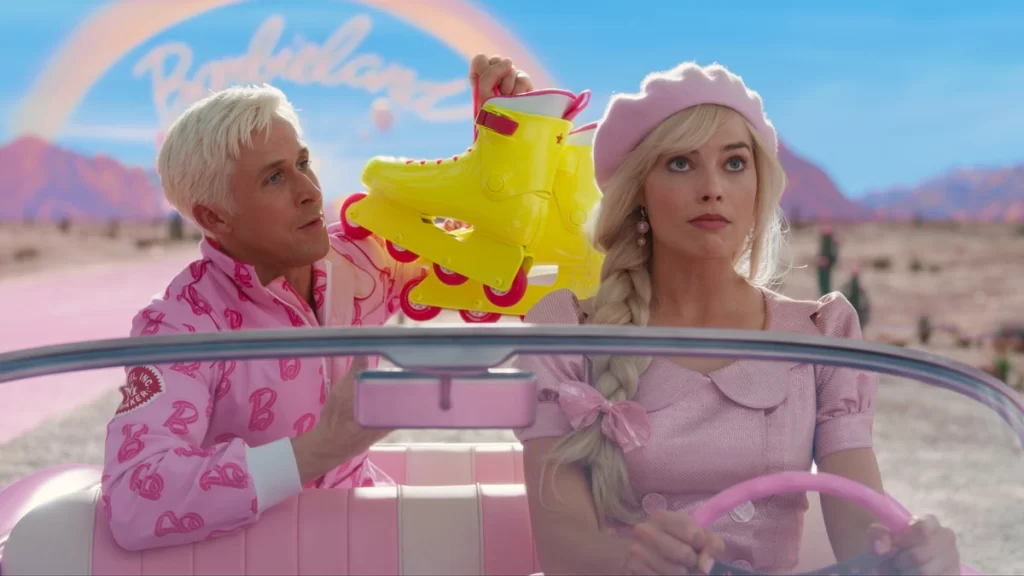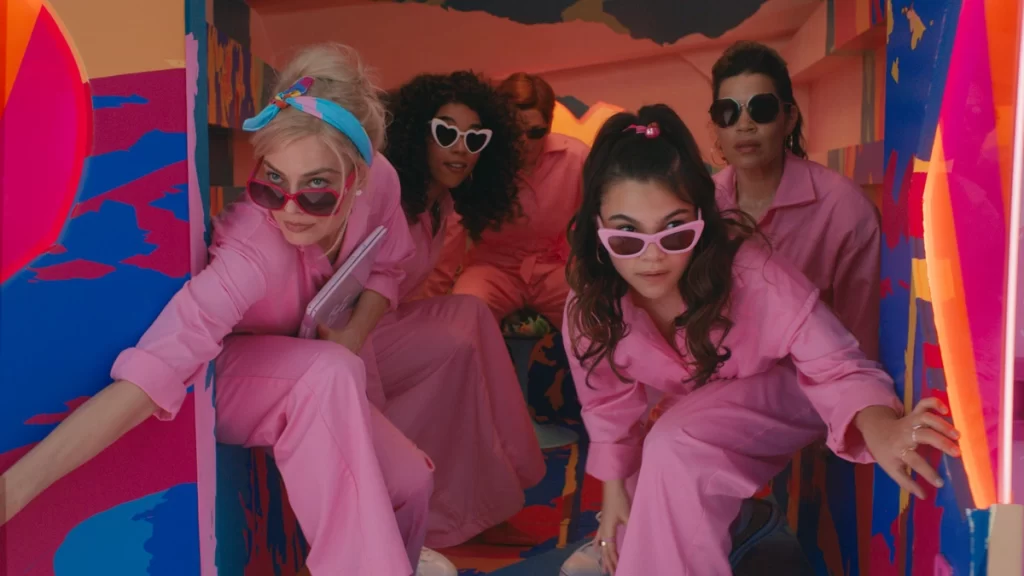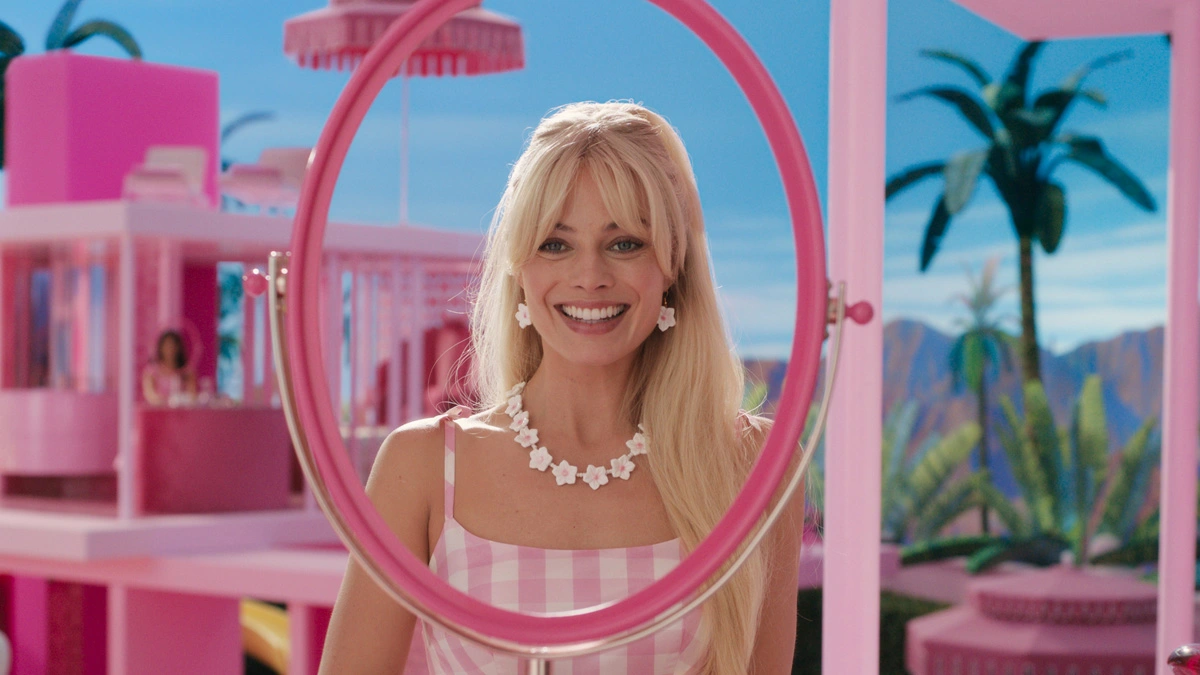The Pitch: For Barbie (Margot Robbie), every day is picture-perfect. She awakens in her Dreamhouse, refreshes in a shower, dons a fabulous outfit, and sets off to socialize with her friends—each one also named Barbie and unfailingly delighted to see her. That’s life in Barbieland: consistently flawless and delightfully predictable. That is, until one day breaks the pattern. On this fateful morning, Barbie’s day isn’t so impeccable. Small inconveniences occur, and she’s plagued by unsettling, persistent thoughts of mortality—quite the departure from typical Barbie fare.
Fortunately, Weird Barbie (Kate McKinnon, frequently seen performing splits) pinpoints the issue: each Barbie in Barbieland is connected to a corresponding girl in the Real World. Something is amiss with our Barbie’s human counterpart. With this revelation, Barbie embarks on a journey beyond Barbieland, venturing into the real world. Accompanying her is Ken (Ryan Gosling), who adores Barbie but grapples with the constant “girls’ night” dynamic, feeling neglected as she rarely sets aside time for him. While Barbie’s quest to find her playmate proves fruitful, Ken’s prolonged exposure to the Real World—along with its contrasting norms—could mean Barbieland will never be as it once was.
Come On, Barbie, Let’s Party: To call Barbie a magic trick would be an understatement. This film, directed by Greta Gerwig in her third solo outing, brilliantly transforms a familiar corporate icon into a resonant, poignant message. Maintaining a balance of whimsicality, humor, and gravitas is pivotal to the film’s impact. The challenge for this review, then, lies in dissecting the enchantment at work, without diminishing the sheer admiration for what this movie accomplishes.
Beyond being a mere toy, Barbie is an emblem of femininity, awash with empowering pink symbolism—an empowerment, however, that has been both weaponized by anti-feminists and critiqued by feminists. Growing up with Barbie often meant internalizing her as the archetype of “the perfect woman,” defined not just by her myriad professional roles, but predominantly by her aesthetic—from her fashionable attire to her sculpted features and her perpetually high-heeled feet.
Gerwig and Noah Baumbach’s screenplay astutely acknowledges these longstanding feminist critiques—though some more superficially than others. (For instance, casting a diverse array of body types for the Barbieland characters doesn’t necessarily atone for decades of promoting unrealistic body standards.) Yet, the film boldly ventures further, examining the dichotomy of Barbie’s potential as a symbol of empowerment and the ways in which good intentions can inadvertently perpetuate harmful norms.
Many themes that Barbie explores will resonate as familiar, reflecting the intricate realities of contemporary womanhood—a topic that feminists from Gloria Steinem to Liz Lemon have been elucidating for years. The recurring discussion of these issues isn’t due to a lack of new topics; it’s a testament to the unfortunate reality that these problems persist.

Imagination, Life Is Your Creation: While digital artistry is instrumental in portraying the expansive realm of Barbieland, it’s the stellar performances that truly breathe life into this fantasy world. Every Barbie and Ken on screen fully leans into a touch of doll-like behavior, reinforcing the notion of these figures as toys animated by unseen children’s hands. Witnessing Robbie collapse to the ground in exaggerated despair is just one of the movie’s numerous comedic highlights.
This film, in its unique grandeur, owes much to Margot Robbie, who has emerged as a dependable star adept at unearthing the humanity within seemingly extravagant characters—from Tonya Harding and Harley Quinn to, now, a literal piece of plastic. With Barbie, Robbie reveals a fresh and captivating dimension of her talent.
Let the Best Supporting Actor campaign commence for Gosling’s portrayal of Ken, few actors have ever appeared to meld so seamlessly with a role. Gosling masterfully captures the various nuances that Gerwig’s script carves out for this character and his pivotal role in the story. There are instances where Gosling appears utterly absurd, in a way that is far bolder than any daredevil motorcycle stunt, and the result is both potent and uproariously funny.
Feel the Glamor in Pink: The world, crafted by cinematographer Rodrigo Prieto and production designer Sarah Greenwood, is as vibrant, vivacious, and delightful as the film’s pop-laden soundtrack. Yet, a subversive sense of humor subtly threads through, slipping in some audacious jokes—especially considering the parent company of this film. (A nod to Zack Snyder’s Justice League was an unexpected twist.)
The ever-humorous Helen Mirren serves as the film’s narrator. She does more than simply propel the narrative and provide key exposition; she also infuses the film with delightful meta-commentary, a feature that is subtly mirrored in the film’s carefully curated soundtrack. Listen closely to the song lyrics, unless the tune happens to be Matchbox Twenty’s “Push.”
Furthermore, Barbie’s own complex legacy as a toy is not immune to comedic critique. The film acknowledges certain peculiarities, such as the controversial Growing Up Skipper doll, which generated its own brand of scandal. Surprisingly though, the film doesn’t seem to attempt an apology for one of the Barbie line’s most contentious iterations: the 1992 Teen Talk Barbie. This version of the doll, with her voice box alternating between remarks about shopping and “math class is hard,” perpetuated a gender stereotype that women-in-STEM initiatives continue to battle against today.

Plastic Imperfections: Unlike her plastic counterpart, the movie’s Barbie has flaws, the most notable being Will Ferrell’s portrayal of Mattel’s CEO. Mattel, as a company, plays a much larger role in the film’s narrative than one might expect. A potential hiccup is Ferrell’s past role in another toy-based movie—he starred in The Lego Movie as the villainous Lord Business. While these two films are distinct in many ways, they share enough in tone and approach that Ferrell’s appearance in Barbie can make the film feel a bit less novel.
Additionally, the movie seems uncertain about how to best utilize Ferrell’s character. He serves several key plot points, but not sufficiently to prevent him from seeming somewhat superfluous. But perhaps that’s it—that’s the film’s single significant flaw.
In reality, Mattel’s current CEO is a man, Ynon Kreiz. The movie takes some liberties with the rest of the company’s executive suite. In truth, three of the ten individuals listed on Mattel’s corporate leadership page are women, including Robbie Brenner, the Executive Producer of Mattel Films. Nevertheless, Gerwig opts to portray Mattel’s leadership as an exclusive club of men in dark suits—a pointed choice, considering that for generations, in many toy companies, it’s these men who have touted their products as empowering for young girls. This could be a significant part of the problem that Barbie aims to address.
The Verdict: At a certain juncture, Barbie boldly steps beyond the confines of reality, embracing a surrealism that carves its own unique rules for the universe in surprising ways. One could devote time to nitpicking the intricacies of this world-building, but that seems almost beside the point—so much so that raising such issues feels almost disrespectful. (There’s even a purposeful dream ballet, making it one of the most impactful dream ballets ever featured in a major studio film.)
This is a movie that is safe for family viewing, yet it speaks as profoundly to adults as it does to children—who, after all, ought to be educated about the challenges posed by patriarchy. Barbie takes the entire audience on a journey that transcends third-wave feminism to deliver poignant commentary on gender, culture, and the pressures endured by not just young girls, but everyone. In the end, it evolves into a beautiful homage to the human experience and the effort to navigate it gracefully, leaving viewers with a sense of gratitude for their own imperfect lives.
Where to Watch: Barbie will be released in theaters on Friday, July 21st.
